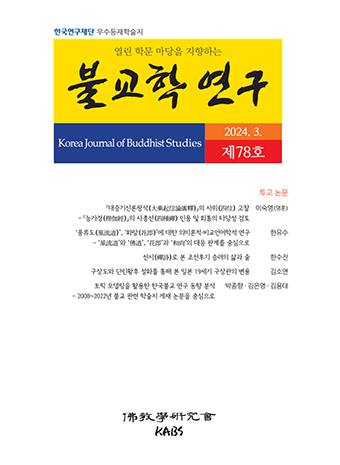Abstract
References
Sorry, not available.
Click the PDF button.
Information
This research aims to study the influence of Buddhism on the ideas of Mao Zedong(毛澤東, 1893-1976) in Chinese traditional thoughts. Our concern was how Mao Zedong accepted and estimated Buddhism. In that way we analogized the entire influence of Buddhism on his ideas. Mao Zedong insisted that the vital force of the history of Chinese philosophy was the ‘open spirit’, which absorbed and changed the external philosophy called ‘Buddhism’. This spirit came in sight into the evaluation of Han Yu(韓愈) and Liu Zongyuan(柳宗元). Unlike Han Yu who understood Buddhism critically, Liu Zongyuan accepted Buddhism positively and developed it as a new philosophy. Mao Zedong’s appreciation of Han Yu and Liu Zongyuan showed his open mind to the eternal world. He thought that the ‘open spirit’ resulted in the dialectical development of ideology. Mao Zedong set a high value on Zen given it. Mao emphasized that Zen Buddhism had a positive role in the struggles along with the other part of social reality, ‘Subjective Activeness’. Also he asserted ‘the Sutra of the Sixth Patriarch’( 『六祖壇經』) became clear that because its nature emphasized labor and the proletarian, because the author of this sutra was born proletarian. Mao also asserted that Hua Yen Buddhism should be evaluated positively, on the basis of the fact that it acted positively to develop a deepening awareness. Mao Zedong’s positive evaluations of Buddhism are as follows: First, Mao attended to the principle of equality of Buddhism. Second, Mao accepted the ‘Subjective activeness’ of Buddhism. Third, Mao actively received ‘Dialectical elements’ of Buddhism. He connected the dialectical materialism of Marxism and ‘the doctrine of dependent origination’(緣起論) of Hua Yen Buddhism(華嚴宗). We find that there is a strong correlation between this positive evaluation of Buddhism and the fact Buddhism influenced the thoughts of Mao Zedong. Actually, Buddhism has had a substantial role in the reformation of modern China. Our significant conclusion is that Mao Zedong intended to make good use of Buddhism in the course of the revolution of modern China in order to solve the tasks of ‘anti-feudalism’ and ‘anti-foreign forces’.
이 글의 목적은 모택동(毛澤東, 1893-1976) 사상에 영향을 준 중 국 전통사상 중 특히 불교 사상이 미친 영향을 찾아보는 것이다. 이 글에서는 마르크스주의의 중국화를 완성한 사상가로 평가되는 모택 동이 불교를 어떻게 평가하고 받아들였는가를 살펴보는 방법으로, 거꾸로 그 사상에 미친 불교의 영향을 유추해보고자 하였다.모택동은 중국철학사가 갖는 생명력은 불교라는 외래 철학을 흡 수하여 변화시킨 데 기원한다고 보았다. 그는 ‘개방 정신’이 중국철 학사를 추동하는 힘이라고 파악하였다. 그가 중국철학사에서개방 정신을 얼마나 중시하였는지는, 당대 한유(韓愈)와 유종원(柳宗元) 에 대한 상반된 평가에서 잘 드러난다. 한유가 불교를 전적인 비판 대상으로 본 것과 달리, 유종원은 불교의 장점을 인정하고 그것을 새 로운 철학으로 발전시켰다는 점에서 긍정적으로 평가하였다. 이러 한 평가는 모택동이 외부 것에 대한 ‘개방 정신’을 얼마나 중시하였 는지를 잘 보여준다. 그 개방 정신이 결국 사상의 변증법적 발전을 이룬다고 보았기 때문이다. 모택동의 선 불교에 대한 평가는 기존의 마르크스주의의 평가와는 상반되게 긍정적이었다. 그는 사회 변혁 과 현실에의 투쟁에 선 불교가 가진 주관적 능동성을 강조하여 긍정 적 역할을 하였음을 강조하였다. 또한 그는 혜능이 노동 인민 출신 이자 불성론을 통하여 평등 사상을 긍정하였다는 점에 근거하여 선 불교 경전인『 육조단경』을 노동 인민적이라고 주장하였다. 그는 또 한 인류 인식의 발전사에서 볼 때, 화엄 불교가 인식사의 한 단계로 서 인식을 심화 발전시키는 적극적인 작용을 하였다고 긍정적으로 평가하였다.모택동의 불교에 대해 긍정적인 평가는 다음과 같다. 첫째, 모택 동은 불교가 갖는 ‘평등’ 사상에 주목하였다. 그는 서구 마르크시즘 의 근대적 평등 개념과 불교의 근원적인 평등을 동시에 받아들임으 로써 혁명의 핵심적인 가치를 담보하려 하였다. 둘째, 모택동은 불 교의 ‘주관적 능동성’을 긍정적으로 수용하였다. 그는 험난한 혁명의 실전 경험 속에서 외부 조건의 제약을 넘어서서 내면의 의지로 이를 타개해가는 자세를 불교에서 찾으려 하였다. 셋째, 모택동은 불교의 변증법적 요소를 적극적으로 받아들였다. 그는 상대적인 것과 절대 적인 것의 상호 연관을 말하는 변증법과 불교, 특히 화엄 불교의 일 다상용(一多相用)의 연기 사상을 연관시켜 받아들였다.결론적으로, 모택동의 불교에 대한 긍정적 평가는 모택동 사상에 미친 불교의 영향을 시사한다. 실제로 중국 근대사회의 전반적인 변 혁 작업에 불교가 결정적인 역할을 한 것은 특기할 만한 일이다. 모 택동은 당시 중국 사회가 필요로 했던 ‘반봉건, 반외세’의 과제를 해 결하는 혁명의 과정에서 불교 사상을 활용하려 하였고, 그런 측면에 서 모택동 사상에 불교가 영향을 미쳤다고 할 수 있다.
Click the PDF button.
- Publisher :Korean Association of Buddhist Studies
- Publisher(Ko) :불교학연구회
- Journal Title :Korea Journal of Buddhist Studies
- Journal Title(Ko) :불교학연구
- Volume : 29
- No :0
- Pages :299 ~ 339


 Korea Journal of Buddhist Studies
Korea Journal of Buddhist Studies






